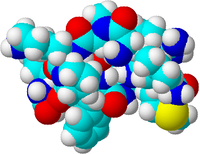
Photo from wikipedia
Curcumin, a plant polyphenol, has been previously reported to attenuate collagen-induced arthritis in rats by modulating the function of the cholinergic system, but the underlying mechanism remains to be identified.… Click to show full abstract
Curcumin, a plant polyphenol, has been previously reported to attenuate collagen-induced arthritis in rats by modulating the function of the cholinergic system, but the underlying mechanism remains to be identified. In this study, primary nodose ganglion (NG) neurons were prepared from the adult rats and the electrophysiological recording was performed using the whole-cell patch clamp technique. Curcumin was shown to reduce total potassium currents and A-type currents, without significant effect on the activation or inactivation of potassium channels. Moreover, curcumin selectively enhanced tetrodotoxin-sensitive (TTX-S) sodium channel currents. These effects could be abolished by methyllycaconitine citrate (specific antagonist of α7 nACh receptor). Interestingly, curcumin did not modulate TTX-resistant (TTX-R) or calcium channels. These results suggest that curcumin increases the excitability of NG neurons by decreasing potassium currents and increasing TTX-S sodium currents via α7 nicotinic acetylcholine receptor (nAchR).
Journal Title: Natural Product Communications
Year Published: 2019
Link to full text (if available)
Share on Social Media: Sign Up to like & get
recommendations!